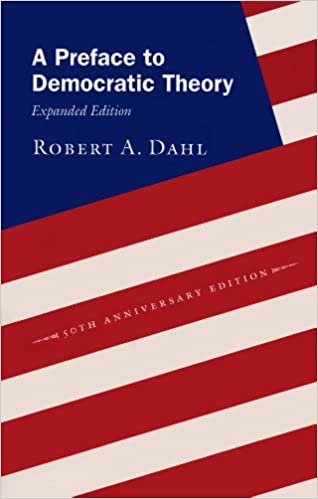

 |

|

The average rating for A preface to democratic theory based on 2 reviews is 2.5 stars.
Review # 1 was written on 2014-03-27 00:00:00 Ronald H. Monahan Ronald H. MonahanRobert Dahl's Preface to Democratic Theory is not an enjoyable read but it is nevertheless an important work in political science. The book's not enjoyable because it suffers from being a product of its time, and in its time it seemed necessary to approach the social sciences like the more mathematically rigorous sciences. That often meant, for example, using graphs and charts to little to no avail in the way of increasing explanatory power of the theory being advanced, and also couching the language of the argument in propositions and axioms, in order to make the soundness of the argument appear as solidly grounded as a geometric system. Criticisms aside, Dahl's book is extremely important for advancing political science in the study of democratic theory. The important distinction Dahl's Preface to Democratic Theory introduces is that between the realities of actually functioning institutions and the ideals to which these institutions make reference to. Dahl refers to the really existing institutions of countries like, say, the United States or Great Britain, any country often referred to as a democracy, as "polyarchies." He defines the ideal institutions as democracies. The really existing institutions, the polyarchies, are what we find when we actually look as the institutions as they function in these different political territories. And what we find is that these countries are managed by a small group of elected officials who serve periodically in their offices as a result of public voting. Also in these countries the citizens enjoy a great degree of freedom expression, have access to sources of information outside government sources, and they can and do form parties to protect various interests. It is in later works that Dahl marks the contrast between polyarchies and ideal democracy. For example, in Dahl's later work, On Political Equality, he argues that citizens must have control over the country's political, economic, and social agenda and all the citizens must be able to effectively participate and have equal say in shaping that agenda. Furthermore, the citizens should all have enough equal opportunities to discover the information relevant to the decision-making process and then act according to the best information. Dahl, of course, acknowledges that this is the ideal and that really existing institutions have not yet achieved the ideal of democracy. |
Review # 2 was written on 2018-12-13 00:00:00 J George J GeorgeImportant theory but MASSIVELY DRY. |
CAN'T FIND WHAT YOU'RE LOOKING FOR? CLICK HERE!!!